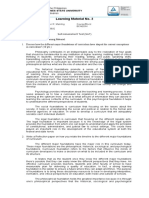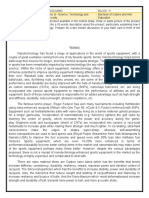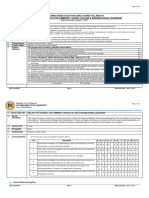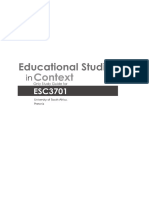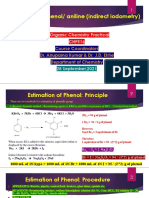THEORIES
THEORIES
Uploaded by
Kathreen MakilingCopyright:
Available Formats
THEORIES
THEORIES
Uploaded by
Kathreen MakilingCopyright
Available Formats
Share this document
Did you find this document useful?
Is this content inappropriate?
Copyright:
Available Formats
THEORIES
THEORIES
Uploaded by
Kathreen MakilingCopyright:
Available Formats
Acting and Current Theories of Creativity
Theories of creativity centered on the individual
Threshold theory predicts that there is a weaker relationship between creativity and intelligence for an IQ
above 120 than for an IQ below 120.
A. INTELLIGENCE THRESHOLD THEORY
Torrance (1962) argues that intelligence is a necessary but not sufficient condition creativity from
the study of individual traits.
According to the threshold theory, a certain level of intelligence is required for creativity to emerge.
However, above a certain level, which is usually set at an intelligence quotient (IQ) of 120, no
positive correlation has been found between the two constructs.
Therefore, genius understood as a high IQ, does not guarantee greater creativity than average
intelligence. A discordant work with this theory is, among others, that of Runco and Albert (1986).
B. EVOLUTIONARY THEORY OF CREATIVITY
• The basic idea of biological evolution is that populations and species of organisms change over time.
Today, when we think of evolution, we are likely to link this idea with one specific person: the British
naturalist Charles Darwin.
• The creativity of human cultures is reminiscent of biological evolution because of the adaptive and open-
ended manner in which change accumulates. (Gabora, 2011)
C. THEORY OF DIVERGENT THINKING
Divergent thinking is cognition that leads in various directions.
Some of these are conventional, and some original.
Because some of the resulting ideas are original, divergent thinking represents the potential for creative
thinking and problem solving
D. THEORY OF MULTIPLE INTELLIGENCES
Theory of Multiple Intelligences
• When you hear the word intelligence, the concept of IQ testing may immediately come to mind.
• Intelligence is often defined as our intellectual potential; something we are born with, something that can
be measured, and a capacity that is difficult to change.
Howard Gardner
• This theory suggests that traditional psychometric views of intelligence are too limited. Gardner first
outlined his theory in his 1983 book Frames of Mind: The Theory of Multiple Intelligences, where he
suggested that all people have different kinds of "intelligences."
• Gardner proposed that there are eight intelligences, and has suggested the possible addition of a ninth
known as "existentialist intelligence."1
• In order to capture the full range of abilities and talents that people possess, Gardner theorizes that
people do not have just an intellectual capacity, but have many kinds of intelligence, including musical,
interpersonal, spatial-visual, and linguistic intelligences.
• The theory of multiple intelligences enjoys considerable popularity with educators. Many teachers utilize
multiple intelligences in their teaching philosophies and work to integrate Gardner’s theory into the
classroom.
• Gardner has cautioned that multiple intelligences should not be conflated with learning styles. (It is also
important to stress that evidence has found that matching instruction to a learner's perceived style has no
benefits in terms of learning outcomes or educational attainment.)
1. VISUAL-SPATIAL INTELLIGENCE People who are strong in visual-spatial intelligence are good at
visualizing things. These individuals are often good with directions as well as maps, charts, videos,
and pictures.
STRENGTHS
• Visual and spatial judgment
CHARACTERISTICS People with visual-spatial intelligence:
• Read and write for enjoyment
• Are good at putting puzzles together
• Interpret pictures, graphs, and charts well
• Enjoy drawing, painting, and the visual arts
• Recognize patterns easily
POTENTIAL CAREER CHOICES
•Architect
•Artist
•Engineer
2. LINGUISTIC-VERBAL INTELLIGENCE People who are strong in linguistic-verbal intelligence are
able to use words well, both when writing and speaking. These individuals are typically very good at
writing stories, memorizing information, and reading.
STRENGTHS
• Words, language, and writing
CHARACTERISTICS
•Remember written and spoken information
•Enjoy reading and writing
•Debate or give persuasive speeches
•Are able to explain things well
•Use humor when telling stories
POTENTIAL CAREER CHOICES
•Writer/journalist
•Lawyer
•Teacher
3. LOGICAL-MATHEMATICAL INTELLIGENCE People who are strong in logicalmathematical
intelligence are good at reasoning, recognizing patterns, and logically analyzing problems. These
individuals tend to think conceptually about numbers, relationships, and patterns.
STRENGTHS
• Analyzing problems and mathematical operations
CHARACTERISTICS
•Have excellent problem-solving skills
•Enjoy thinking about abstract ideas
•Like conducting scientific experiments
•Can solve complex computations
POTENTIAL CAREER CHOICES
•Scientist
•Mathematician
•Computer programmer
•Engineer
•Accountant
4. BODILY-KINESTHETIC INTELLIGENCE Those who have high bodilykinesthetic intelligence are
said to be good at body movement, performing actions, and physical control. People who are strong
in this area tend to have excellent hand-eye coordination and dexterity.
STRENGTHS
• Physical movement, motor control
CHARACTERISTICS People with bodily-kinesthetic intelligence:
•Are skilled at dancing and sports
•Enjoy creating things with his or her hands
•Have excellent physical coordination
•Remember by doing, rather than hearing or seeing
POTENTIAL CAREER CHOICES
•Craftsperson
•Dancer
•Builder
•Surgeon
•Sculptor
•Actor
5. MUSICAL INTELLIGENCE People who have strong musical intelligence are good at thinking in
patterns, rhythms, and sounds. They have a strong appreciation for music and are often good at
musical composition and performance.
STRENGTHS
• Rhythm and music
CHARACTERISTICS
•Enjoy singing and playing musical instruments
•Recognize musical patterns and tones easily
•Remember songs and melodies
•Have a rich understanding of musical structure, rhythm, and notes
POTENTIAL CAREER CHOICES
•Musician
•Composer
•Singer
•Music teacher
•Conductor
6. INTERPERSONAL INTELLIGENCE Those who have strong interpersonal intelligence are good at
understanding and interacting with other people. These individuals are skilled at assessing the
emotions, motivations, desires, and intentions of those around them.
STRENGTHS
• Understanding and relating to other people CHARACTERISTICS People with interpersonal intelligence:
•Communicate well verbally
•Are skilled at nonverbal communication
•See situations from different perspectives
•Create positive relationships with others
•Resolve conflicts in group settings
POTENTIAL CAREER CHOICES If you're strong in interpersonal intelligence, good career choices for you
are: •Psychologist
•Philosopher
•Counselor
•Salesperson
•Politician
7. INTRAPERSONAL INTELLIGENCE Individuals who are strong in intrapersonal intelligence are
good at being aware of their own emotional states, feelings, and motivations. They tend to enjoy
self-reflection and analysis, including daydreaming, exploring relationships with others, and
assessing their personal strengths.
STRENGTHS
• Introspection and self-reflection Characteristics
•Analyze their strengths and weaknesses well
•Enjoy analyzing theories and ideas
•Have excellent self-awareness
•Understand the basis for his or her own motivations and feelings
POTENTIAL CAREER CHOICES
•Philosopher
•Writer
•Theorist
•Scientist
8. NATURALISTIC INTELLIGENCE Naturalistic is the most recent addition to Gardner’s theory and
has been met with more resistance than his original seven intelligences. According to Gardner,
individuals who are high in this type of intelligence are more in tune with nature and are often
interested in nurturing, exploring the environment, and learning about other species. These
individuals are said to be highly aware of even subtle changes to their environments.
STRENGTHS
• Finding patterns and relationships to nature
CHARACTERISTICS
•Are interested in subjects such as botany, biology, and zoology
•Categorize and catalog information easily
•Enjoy camping, gardening, hiking, and exploring the outdoors
•Dislikes learning unfamiliar topics that have no connection to nature
POTENTIAL CAREER CHOICES
•Biologist
•Conservationist
• Gardener
Farmer
9. EXISTENTIAL INTELLIGENCE Existential intelligence is the ninth type of intelligence suggested as
an addition to Gardner's original theory. He described existential intelligence as an ability to delve
into deeper questions about life and existence. People with this type of intelligence contemplate the
"big" questions about topics such as the meaning of life and how actions can serve larger goals.
STRENGTHS
• An ability to see the big picture
CHARACTERISTICS
•Have a long-term outlook
•Consider how current actions influence future outcomes
•Interest in questions about the meaning of life and death
•Strong interest and concern for others
•The ability to see situations from an outside perspective
POTENTIAL CAREER CHOICES
•Philosopher
•Theologian
•Pastoral counselor
•Pastor
E. INVESTMENT THEORY
• Our investment theory (Sternberg & Lubart, 1991, 1995) concerns the decision to be creative.
• Investment theory, is based on the notion that creative people decide to buy low and sell high in the world
of ideas – that is, they generate ideas that tend to “defy the crowd” (buy low), and then, when they have
persuaded many people, they sell high, meaning they move on to the next unpopular idea (see also
Rubenson & Runco, 1992).
You might also like
- DOLE ChecklistDocument3 pagesDOLE ChecklistJohn Menguito100% (1)
- Al Rawabi Dairy CompanyDocument11 pagesAl Rawabi Dairy CompanyZahra BatoolNo ratings yet
- Learners Who Are Gifted and Talented (Visual Arts & Music)Document14 pagesLearners Who Are Gifted and Talented (Visual Arts & Music)gothic wontonNo ratings yet
- Multiple IntelligencesDocument73 pagesMultiple IntelligencesJeniffer Quiambao Tango-anNo ratings yet
- Learn Like a Polymath: How to Teach Yourself Anything, Develop Multidisciplinary Expertise, and Become IrreplaceableFrom EverandLearn Like a Polymath: How to Teach Yourself Anything, Develop Multidisciplinary Expertise, and Become IrreplaceableRating: 4 out of 5 stars4/5 (23)
- Multiple Intelligence TheoryDocument32 pagesMultiple Intelligence Theoryjohn.pasion1993No ratings yet
- Intelligence and CreativityDocument48 pagesIntelligence and CreativitytumdonokimaakichutNo ratings yet
- Educ. 402: (Advanced Sociological & Psychological Foundations of Education)Document17 pagesEduc. 402: (Advanced Sociological & Psychological Foundations of Education)Ma Christine Burnasal TejadaNo ratings yet
- Reading Journal - Multiple IntelligencesDocument3 pagesReading Journal - Multiple IntelligencescariusernameajasusahNo ratings yet
- Intelligence: Mr. Kyle SchlossDocument38 pagesIntelligence: Mr. Kyle SchlossAriel SalmonNo ratings yet
- Special Ed 10Document34 pagesSpecial Ed 10jennybenibe12No ratings yet
- MultiDocument13 pagesMultiMj Ong Pierson GarboNo ratings yet
- Multiple IntelligencesDocument28 pagesMultiple IntelligencesYIKI ISAACNo ratings yet
- Chapter 8 - Cognitive AspectDocument48 pagesChapter 8 - Cognitive Aspectfrancine.malit24No ratings yet
- Psychology Unitiii Intelligence 200504122559Document50 pagesPsychology Unitiii Intelligence 200504122559Ifsa parvaizNo ratings yet
- Intelligence PresentationDocument27 pagesIntelligence PresentationumairdammarNo ratings yet
- Chapter 6Document17 pagesChapter 6Merl YnNo ratings yet
- Howard GardnerDocument14 pagesHoward GardnermissfafauNo ratings yet
- IntelligenceDocument8 pagesIntelligenceFatima KhanNo ratings yet
- Gardner's Theory of Multiple Intelligen CesDocument8 pagesGardner's Theory of Multiple Intelligen CesMary Jezreen SagaNo ratings yet
- Teachers Training Program-MI BasedDocument38 pagesTeachers Training Program-MI BasedIbrahim Bin MuhammedNo ratings yet
- Chapter 6 Learners With Additional NeedsDocument63 pagesChapter 6 Learners With Additional NeedsThal De DiosNo ratings yet
- Chapter 4 (Mpu0033u2f)Document27 pagesChapter 4 (Mpu0033u2f)Amsha vahiniNo ratings yet
- Intellige NCE: Group 14Document35 pagesIntellige NCE: Group 14Afz MinNo ratings yet
- Dgnmiyear Psychology Unitvi Intelligence 200611074645Document74 pagesDgnmiyear Psychology Unitvi Intelligence 200611074645reemakodavandyNo ratings yet
- Multiple of Nida Principles of Teaching FinalDocument27 pagesMultiple of Nida Principles of Teaching FinalReymark Petrache CariñoNo ratings yet
- MI TheoryDocument6 pagesMI TheoryAbdullah TahirNo ratings yet
- Gardner's Theory of Multiple IntelligencesDocument10 pagesGardner's Theory of Multiple IntelligencesHazel Leah Khae Arias100% (1)
- Thinking, Language & IntelligenceDocument22 pagesThinking, Language & IntelligenceXamineyNo ratings yet
- CH 1 Variations in Psychological AttributesDocument14 pagesCH 1 Variations in Psychological AttributesMahimaNo ratings yet
- Learning StylesDocument18 pagesLearning StylesNishita JataniyaNo ratings yet
- Intelligence Medcs 2022Document57 pagesIntelligence Medcs 2022Pěťěř ĽômběNo ratings yet
- IntelligenceDocument41 pagesIntelligenceNORHAMIDAH AYUNANNo ratings yet
- Gardner's Theory of Multiple IntelligencesDocument12 pagesGardner's Theory of Multiple IntelligencesArzu FarshiNo ratings yet
- Multiple IntelligenceDocument17 pagesMultiple IntelligenceAnirudh NairNo ratings yet
- Chapter 3 Lessons 6 7Document26 pagesChapter 3 Lessons 6 7andenextenderNo ratings yet
- Multiple Intelligence CVAC TUTORIALS .PPTX FinalDocument17 pagesMultiple Intelligence CVAC TUTORIALS .PPTX FinalnafisayusufiNo ratings yet
- PSY 101: Introduction To Psychology Chapter 7: IntelligenceDocument18 pagesPSY 101: Introduction To Psychology Chapter 7: IntelligenceJehad MahmoodNo ratings yet
- Multiple Intelligences Gardner FinalDocument46 pagesMultiple Intelligences Gardner FinalbalusdanjeelanNo ratings yet
- What Is Intelligence?: Intelligence and Individual DifferencesDocument48 pagesWhat Is Intelligence?: Intelligence and Individual DifferencesSindujaa SelliahNo ratings yet
- Ict PDFDocument13 pagesIct PDFKhadija LaaraichNo ratings yet
- INTELLIGENCEDocument31 pagesINTELLIGENCEwork.basim2No ratings yet
- Gardener's Theory (Theory of Multiple Intelligence) byDocument18 pagesGardener's Theory (Theory of Multiple Intelligence) byVenkathachala BgNo ratings yet
- Session 5 InteligenceDocument29 pagesSession 5 Inteligenceleila sheibaniNo ratings yet
- Universidad Nacional de Chimborazo: Health Sciences Faculty Languages CenterDocument25 pagesUniversidad Nacional de Chimborazo: Health Sciences Faculty Languages CenterMERCEDES GALLEGOSNo ratings yet
- Multiple IntelligenceDocument7 pagesMultiple IntelligenceSude KılıçNo ratings yet
- Howard Gardner's Theory of Multiple IntelligencesDocument50 pagesHoward Gardner's Theory of Multiple IntelligencesIda Marie Vega EscolanoNo ratings yet
- Use Your Brain - Multiple Intelligences Presented By: Afizal Fikri SyukriDocument33 pagesUse Your Brain - Multiple Intelligences Presented By: Afizal Fikri Syukrivampire88100% (1)
- What Are Multiple Intelligences?Document6 pagesWhat Are Multiple Intelligences?Linda De la BarreraNo ratings yet
- Intelligence CompleteDocument42 pagesIntelligence CompleteShaista KhattakNo ratings yet
- Gardner's Theory of Multiple IntelligencesDocument16 pagesGardner's Theory of Multiple IntelligencesSa1amandra 3No ratings yet
- Multiple Intelligences: Howard Gardner (1991)Document20 pagesMultiple Intelligences: Howard Gardner (1991)Ariel MermyNo ratings yet
- INTELLIGENCEDocument57 pagesINTELLIGENCEFarhan razaNo ratings yet
- Theory of Multiple IntelligencesDocument6 pagesTheory of Multiple Intelligenceshelen romeroNo ratings yet
- DBD IntroDocument9 pagesDBD IntroRAMA GOTHOSKAR 21223251No ratings yet
- Gardner's Theory of Multiple IntelligencesDocument8 pagesGardner's Theory of Multiple IntelligencesMariela FuentesNo ratings yet
- EDUC 324 - Current Trends/Issues in Science: Discussant: Neil Anthony Alonday Professor: Dr. Anavi EchavarriDocument11 pagesEDUC 324 - Current Trends/Issues in Science: Discussant: Neil Anthony Alonday Professor: Dr. Anavi EchavarriRosalie SaavedraNo ratings yet
- Multiple Intelligences and Robert Sternberg's Mental Self-Government TheoryDocument8 pagesMultiple Intelligences and Robert Sternberg's Mental Self-Government Theoryisabelcadagtan10No ratings yet
- SocionicsDocument19 pagesSocionicsEgor BashaievNo ratings yet
- Intelligence, GNM, RajeshDocument59 pagesIntelligence, GNM, RajeshtravellergenixxNo ratings yet
- Acsd 113 Multiple Intelligence Assignment Eiril DanielDocument8 pagesAcsd 113 Multiple Intelligence Assignment Eiril DanielEiril DanielNo ratings yet
- IntelligenceDocument55 pagesIntelligenceJason DayNo ratings yet
- SoloDocument3 pagesSoloKathreen MakilingNo ratings yet
- Example of Learning PlanDocument3 pagesExample of Learning PlanKathreen MakilingNo ratings yet
- The Teacher and The Community, School Culture and Organizational LeadershipDocument7 pagesThe Teacher and The Community, School Culture and Organizational LeadershipKathreen MakilingNo ratings yet
- The Teacher and The Community, School Culture and Organizational LeadershipDocument4 pagesThe Teacher and The Community, School Culture and Organizational LeadershipKathreen MakilingNo ratings yet
- Pre - Test CLASSIFICATION OF TERMS. Inside The Box Are Filipino and Spanish Terminologies UsedDocument2 pagesPre - Test CLASSIFICATION OF TERMS. Inside The Box Are Filipino and Spanish Terminologies UsedKathreen MakilingNo ratings yet
- PE2 Self Defense MODULE 3Document6 pagesPE2 Self Defense MODULE 3Kathreen MakilingNo ratings yet
- Learning Material No. 2: Catanduanes State UniversityDocument2 pagesLearning Material No. 2: Catanduanes State UniversityKathreen MakilingNo ratings yet
- MMWDocument18 pagesMMWKathreen MakilingNo ratings yet
- PE2 Self Defense MODULE 1Document3 pagesPE2 Self Defense MODULE 1Kathreen MakilingNo ratings yet
- NSTP 2 Ideal CommunityDocument2 pagesNSTP 2 Ideal CommunityKathreen MakilingNo ratings yet
- Makiling, Kathreen R. GEC E3 - Chapter-6-Activity 5Document4 pagesMakiling, Kathreen R. GEC E3 - Chapter-6-Activity 5Kathreen MakilingNo ratings yet
- Major Development Programs and Personalities in Science and Technologies in The PhilippinesDocument4 pagesMajor Development Programs and Personalities in Science and Technologies in The PhilippinesKathreen Makiling75% (4)
- Chapter 1 Module 2Document5 pagesChapter 1 Module 2Kathreen MakilingNo ratings yet
- Nano ProductDocument1 pageNano ProductKathreen MakilingNo ratings yet
- Makiling, Kathreen R. PE 4 - SPORTS LM1Document3 pagesMakiling, Kathreen R. PE 4 - SPORTS LM1Kathreen MakilingNo ratings yet
- Makiling, Kathreen R. PE 4 - SPORTS LM2Document2 pagesMakiling, Kathreen R. PE 4 - SPORTS LM2Kathreen MakilingNo ratings yet
- CAEd 103 - Module 1 - Makiling, Kathreen R.Document10 pagesCAEd 103 - Module 1 - Makiling, Kathreen R.Kathreen MakilingNo ratings yet
- The Kind of Professional I Want To BeDocument1 pageThe Kind of Professional I Want To BeKathreen MakilingNo ratings yet
- CAEd 103 - Module 2 - Makiling, Kathreen R.Document5 pagesCAEd 103 - Module 2 - Makiling, Kathreen R.Kathreen MakilingNo ratings yet
- Outcomes-Based Education (Obe) Course Syllabus in EDUC 204 - The Teacher & The Community, School Culture & Organizational LeadershipDocument10 pagesOutcomes-Based Education (Obe) Course Syllabus in EDUC 204 - The Teacher & The Community, School Culture & Organizational LeadershipKathreen MakilingNo ratings yet
- Dlp-Epp 6 - Week 1 - Day 3 - 3rd QuarterDocument1 pageDlp-Epp 6 - Week 1 - Day 3 - 3rd QuarterSHARON MAY CRUZNo ratings yet
- BIOINFORMATICSDocument4 pagesBIOINFORMATICSCecilia MukototsiNo ratings yet
- Should The School Decide On A Student's Appearance?Document3 pagesShould The School Decide On A Student's Appearance?4crazy TeamNo ratings yet
- Traffic Characteristics and ShockwavesDocument84 pagesTraffic Characteristics and ShockwavesNala A.No ratings yet
- Universo de Reposio MobilDocument36 pagesUniverso de Reposio MobilAdrian MartinNo ratings yet
- Esc3701 SGDocument147 pagesEsc3701 SGshanique.coxenNo ratings yet
- Germán Campos Muñoz (2021) - The Classics in South America Five Case StudiesDocument273 pagesGermán Campos Muñoz (2021) - The Classics in South America Five Case StudiesdserranolozanoNo ratings yet
- PH Games. Week 2Document3 pagesPH Games. Week 2Nicholas Bonn SingNo ratings yet
- University of Cebu - Main Campus College of Teacher Education Sanciangko Street, Cebu City SECOND SEMESTER 2020-2021 TC Ec 322 - Enhancement Course 2Document4 pagesUniversity of Cebu - Main Campus College of Teacher Education Sanciangko Street, Cebu City SECOND SEMESTER 2020-2021 TC Ec 322 - Enhancement Course 2FatimaNo ratings yet
- OLET1504 - Semester 1, 2021Document10 pagesOLET1504 - Semester 1, 2021daisymaelee4No ratings yet
- Machine Elements ReviewerDocument97 pagesMachine Elements Revieweranne calabasaNo ratings yet
- Exp 8 Lipids PDFDocument7 pagesExp 8 Lipids PDFIsabel Joice EnriquezNo ratings yet
- FT - Python Flask DeveloperDocument2 pagesFT - Python Flask DeveloperarjunrkaleNo ratings yet
- Lecture-7 & 8:: Primary Economic Activities: AgricultureDocument19 pagesLecture-7 & 8:: Primary Economic Activities: AgricultureMuktar HossainNo ratings yet
- Estimation of Phenol/ Aniline (Indirect Iodometry) : Organic Chemistry Practical CHP516Document7 pagesEstimation of Phenol/ Aniline (Indirect Iodometry) : Organic Chemistry Practical CHP516BT20CME033 Gautam TahilyaniNo ratings yet
- Martin D. S. Braine, David P. O'Brien (Editors) - Mental Logic-Lawrence Erlbaum Associates (1998)Document489 pagesMartin D. S. Braine, David P. O'Brien (Editors) - Mental Logic-Lawrence Erlbaum Associates (1998)Artur Magoga CardozoNo ratings yet
- The Impact of Covid-19 On Construction Projects in KuwaitDocument5 pagesThe Impact of Covid-19 On Construction Projects in KuwaitADI LINA MUSTAFFANo ratings yet
- Caldirola KanaiDocument5 pagesCaldirola KanaiJavier Morales TellezNo ratings yet
- En 12668 2 Certified ProbespdfDocument2 pagesEn 12668 2 Certified Probespdfcheikh ahmedNo ratings yet
- Essay Keeping Strets CleanDocument2 pagesEssay Keeping Strets CleanLuka KaroianiNo ratings yet
- Ams 3125 Bearing Vibration Monitor en 39920Document3 pagesAms 3125 Bearing Vibration Monitor en 39920EyuNo ratings yet
- Iso 14692-2-2002ZDocument3 pagesIso 14692-2-2002ZJiss MathewNo ratings yet
- Water MGT in HillDocument15 pagesWater MGT in HillIrfan HyderNo ratings yet
- Topic 2 Job Safety Analysis & HirarcDocument65 pagesTopic 2 Job Safety Analysis & HirarcrieNo ratings yet
- 03 Drop Dynamics in The Inkjet PrintingDocument8 pages03 Drop Dynamics in The Inkjet PrintingVatsalya TandonNo ratings yet
- Detection and Monitoring of Underground Coal Mine Gases at Lakhra Coal Mines, PakistanDocument2 pagesDetection and Monitoring of Underground Coal Mine Gases at Lakhra Coal Mines, PakistanAhsan AliNo ratings yet
- Support CallCenterTutorial Erlang-By-LokadDocument2 pagesSupport CallCenterTutorial Erlang-By-LokaddineshNo ratings yet
- Design Brief - Elementary SchoolDocument5 pagesDesign Brief - Elementary SchoolUday BhatnagarNo ratings yet




































































